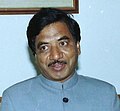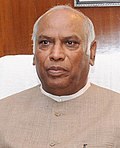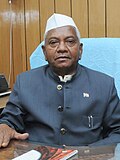| No. | Portrait | Minister
(Birth-Death)
Constituency | Term of office | Political party | Ministry | Prime Minister |
|---|
| From | To | Period |
|---|
| Minister of Social Security |
|---|
| 1 | |  | Ram Subhag Singh
(1917–1980)
MP for Bikramganj
(MoS) | 9 June
1964 | 13 June
1964 | 4 days | Indian National Congress | Shastri | | Lal Bahadur Shastri |
|---|
| 2 | |  | Ashoke Kumar Sen
(1913–1996)
MP for Calcutta North West | 13 June
1964 | 11 January
1966 | 1 year, 212 days |
|---|
11 January
1966 | 24 January
1966 | Nanda II | | Gulzarilal Nanda |
| Minister of Social Welfare |
|---|
| 3 | |  | Kotha Raghuramaiah
(1912–1979)
MP for Guntur
(MoS) | 24 January
1966 | 25 March
1966 | 60 days | Indian National Congress | Indira I | | Indira Gandhi |
|---|
| 4 | |  | Asoka Mehta
(1911–1984)
Rajya Sabha MP for Maharashtra, until 1967
MP for Bhandara | 25 March
1966 | 13 March
1967 | 2 years, 150 days |
|---|
13 March
1967 | 22 August
1968 | Indira II |
| 5 | |  | Panampilly Govinda Menon
(1906–1970)
MP for Mukundapuram | 22 August
1968 | 23 May
1970 | 1 year, 274 days |
|---|
| 6 | |  | Kengal Hanumanthaiah
(1908–1980)
MP for Bangalore City | 26 May
1970 | 18 March
1971 | 296 days | Indian National Congress (R) | |
|---|
| 7 | |  | Siddhartha Shankar Ray
(1920–2010)
MP for Raiganj | 18 March
1971 | 20 March
1972 | 1 year, 2 days | Indira III |
|---|
| 8 | |  | Saiyid Nurul Hasan
(1921–1993)
Rajya Sabha MP for Uttar Pradesh
(MoS, I/C) | 24 March
1972 | 24 March
1977 | 5 years, 0 days |
|---|
| 9 | |  | Pratap Chandra Chunder
(1919–2008)
MP for Calcutta North East | 24 March
1977 | 28 July
1979 | 2 years, 126 days | Janata Party | Desai | | Morarji Desai |
|---|
| 10 | |  | Karan Singh
(born 1931)
MP for Udhampur | 28 July
1979 | 19 August
1979 | 22 days | Indian National Congress (Urs) | Charan | | Charan Singh |
|---|
| 11 | |  | Sathiavani Muthu
(1923–1999)
Rajya Sabha MP for Tamil Nadu | 19 August
1979 | 23 December
1979 | 126 days | All India Anna Dravida Munnetra Kazhagam |
|---|
| 12 | |  | Shankarrao Chavan
(1920–2004)
MP for Nanded | 19 October
1980 | 8 August
1981 | 293 days | Indian National Congress (I) | Indira IV | | Indira Gandhi |
|---|
| 13 | |  | Sheila Kaul
(1915–2015)
MP for Lucknow
(MoS, I/C) | 8 August 1981 | 31 October 1984 | 3 years, 140 days |
|---|
| 4 November 1984 | 31 December 1984 | Rajiv I | | Rajiv Gandhi |
| Minister of Women and Social Welfare |
|---|
| 14 | |  | Maragatham Chandrasekar
(1917–2001)
MP for Sriperumbudur
(MoS, I/C) | 31 December 1984 | 25 September 1985 | 268 days | Indian National Congress (I) | Rajiv II | | Rajiv Gandhi |
|---|
| 15 | |  | Rajendra Kumari Bajpai
(1925–1999)
MP for Sitapur
(MoS, I/C) | 25 September
1985 | 2 December
1989 | 4 years, 68 days |
|---|
| Minister of Welfare |
|---|
| 16 | |  | Ram Vilas Paswan
(1946–2020)
MP for Hajipur | 6 December
1989 | 10 November
1990 | 1 year, 4 days | Janata Dal | Vishwanath | | Vishwanath Pratap Singh |
|---|
| – | |  | Chandra Shekhar
(1927–2007)
MP for Ballia
(Prime Minister) | 21 November
1990 | 21 June
1991 | 212 days | Samajwadi Janata Party (Rashtriya) | Chandra Shekhar | | Chandra Shekhar |
|---|
| 17 | |  | Sitaram Kesri
(1919–2000)
Rajya Sabha MP for Bihar | 21 June
1991 | 16 May
1996 | 4 years, 330 days | Indian National Congress (I) | Rao | | P. V. Narasimha Rao |
|---|
| 18 | |  | Kariya Munda
(born 1936)
MP for Khunti | 16 May
1996 | 1 June
1996 | 16 days | Bharatiya Janata Party | Vajpayee I | | Atal Bihari Vajpayee |
|---|
| 19 | |  | Balwant Singh Ramoowalia
(born 1942)
Rajya Sabha MP for Uttar Pradesh | 1 June
1996 | 21 April
1997 | 1 year, 291 days | Independent | Deve Gowda | | H. D. Deve Gowda |
|---|
21 April
1997 | 19 March
1998 | Gujral | | Inder Kumar Gujral |
| 20 | |  | Maneka Gandhi
(born 1956)
MP for Pilibhit
(MoS, I/C) | 19 March
1998 | 23 May
1998 | 65 days | Vajpayee II | | Atal Bihari Vajpayee |
|---|
| Minister of Social Justice and Empowerment |
|---|
| 21 | |  | Maneka Gandhi
(born 1956)
MP for Pilibhit
(MoS, I/C) | 23 May
1998 | 13 October
1999 | 3 years, 101 days | Independent | Vajpayee II | | Atal Bihari Vajpayee |
|---|
13 October
1999 | 1 September
2001 | Vajpayee III |
| 22 | |  | Satyanarayan Jatiya
(born 1946)
MP for Ujjain | 1 September
2001 | 22 May
2004 | 2 years, 264 days | Bharatiya Janata Party |
|---|
| 23 | |  | Meira Kumar
(born 1945)
MP for Sasaram | 23 May
2004 | 22 May
2009 | 4 years, 364 days | Indian National Congress | Manmohan I | | Manmohan Singh |
|---|
| 24 | |  | Mukul Wasnik
(born 1959)
MP for Ramtek | 28 May
2009 | 27 October
2012 | 3 years, 152 days | Manmohan II |
|---|
| 26 | |  | Selja Kumari
(born 1962)
MP for Ambala | 28 October
2012 | 28 January
2014 | 1 year, 92 days |
|---|
| 27 | |  | Mallikarjun Kharge
(born 1941)
MP for Gulbarga | 28 January
2014 | 26 May
2014 | 118 days |
|---|
| 28 | |  | Thawar Chand Gehlot
(born 1948)
Rajya Sabha MP for Madhya Pradesh | 27 May
2014 | 30 May
2019 | 7 years, 41 days | Bharatiya Janata Party | Modi I | | Narendra Modi |
|---|
31 May
2019 | 7 July
2021 | Modi II |
| 29 | |  | Virendra Kumar Khatik
(born 1954)
MP for Tikamgarh | 7 July
2021 | 9 June
2024 | 4 years, 96 days |
|---|
10 June
2024 | Incumbent | Modi III |
|
















































